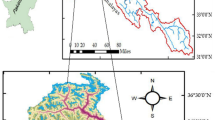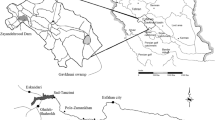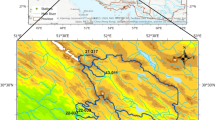Abstract
River flow modeling plays a leading role in the management of water resources and ensuring sustainability. The complex nature of hydrological systems and the difficulty in the application process have led researchers to seek more instantaneous methods for flow predictions. Therefore, with the development of artificial intelligence-based techniques, hybrid modeling has become popular among hydrologists in recent years. For that reason, this study seeks to develop a hybrid model that integrates an adaptive neuro-fuzzy inference system (ANFIS) with a genetic algorithm (GA) to predict river flow. Fundamentally, the performance of an ANFIS model depends on the optimum model parameters. Thus, it is aimed to increase the prediction performance by optimizing the ANFIS parameters with the population-based GA algorithm, which is a powerful algorithm. In this respect, the data gathered from Zamanti and Körkün Flow Measurement Stations (FMS) of Seyhan River, one of Turkey's significant rivers, were employed. Besides, the proposed hybrid ANFIS-GA approach was compared to classical ANFIS model to demonstrate the improvement of its performance. Also, within the scope of simulation studies, the traditional artificial neural networks (ANN) and the long-short term memory (LSTM) method which is a quite popular in recent years were used to predict streamflow data. The estimation results of the models were evaluated with RMSE, MAE, MAPE, SD, and R2 statistical metrics. In a nutshell, the outcomes indicated that the proposed ANFIS-GA method was the most successful model by achieving the highest values of R2 (≈0.9409) and R2 (≈0.9263) for the Zamanti and Körkün FMS data.














Similar content being viewed by others
Availability of Data and Materials
The data will be available upon reasonable request.
References
Abyaneh HZ, Nia AM, Varkeshi MB, Marofi S, Kisi O (2011) Performance evaluation of ANN and ANFIS models for estimating garlic crop evapotranspiration. J Irrig Drain Eng 137:280–286
Acikel S, Ekmekci M (2021) Distinction of multiple groundwater systems in a coastal karst spring zone in SW Turkey by hydrochemical and isotopic characteristics. Bull Eng Geol Env 80:5781–5795
Adnan RM, Mostafa RR, Elbeltagi A et al (2022) Development of new machine learning model for streamflow prediction: Case studies in Pakistan. Stoch Environ Res Risk Assess 36:999–1033
Akrami SA, Nourani V, Hâkim SJS (2014) Development of nonlinear model based on wavelet-ANFIS for rainfall forecasting at Klang Gates Dam. Water Resour Manage 28(10):2999–3018
Arslan N, Sekertekin A (2019) Application of long short-term memory neural network model for the reconstruction of MODIS land surface temperature images. J Atmos Sol Terr Phys 194:105100
Azad A, Karami H, Farzin S et al (2018) Prediction of water quality parameters using ANFIS optimized by intelligence algorithms (Case Study: Gorganrood River). KSCE J Civ Eng 22:2206–2213
Calp MH (2019) A hybrid ANFIS-GA approach for estimation of regional rainfall amount. Gazi Univ J Sci 32(1):145–162
Chau R et al (2005) Benchmarking nanotechnology for high-performance and low-power logic transistor applications. IEEE Trans Nanotechnol 4(2):153–158
Dehghani M, Seifi A, Madvar HR (2018) Novel forecasting models for immediate-short-term to long-term influent flow prediction by combining ANFIS and greywolf optimization. J Hydrol 576:698–725
Fadaee M, Mahdavi-Meymand A, Zounemat-Kermani M (2020) Suspended sediment prediction using integrative soft computing models: on the analogy between the butterfly optimization and genetic Algorithms. Geocarto Int 37(4):1–14
Gerger R, Gumus V, Dere S (2021) The evaluation of different artificial intelligence methods in determination of Tigris basin’s rainfall runoff relationship. BSEU J Sci 8(1):300–311
Haznedar B, Arslan MT, Kalinli A (2017) Training ANFIS structure using genetic algorithm for liver cancer classification based on microarray gene expression data. Sakarya Univ J Sci 21(1):54–62
Haznedar B, Arslan MT, Kalinli A (2021) Optimizing ANFIS using simulated annealing algorithm for classification of microarray gene expression cancer data. Med Biol Eng Comput 59:497–509
Holland JH (1975) Adaptation in natural and artificial systems. University of Michigan Press, Ann Arbor, MI, USA, p 183
Hu H, Zhang J, Li TA (2021) Novel hybrid decompose-ensemble strategy with a vmd-bpnn approach for daily streamflow estimating. Water Resour Manage 35:5119–5138
Kara A (2019) Global solar irradiance time series prediction using long short-term memory network. Gazi Univ J Sci 4:882–892
Karaboga D, Kaya E (2019) Adaptive network based fuzzy inference system (ANFIS) training approaches: a comprehensive survey. Artif Intell Rev 52(4):2263–2293
Karami H, DadrasAjirlou Y, Jun C, Bateni SM, Band SS, Mosavi A, Moslehpour M, Chau KW (2022) A novel approach for estimation of sediment load in dam reservoir with hybrid intelligent algorithms. Front Environ Sci 10:821079
Kayhomayoon Z, Babaeian F, Ghordoyee Milan S, Arya Azar N, Berndtsson RA (2022) Combination of metaheuristic optimization algorithms and machine learning methods improves the prediction of groundwater level. Water 14:751
Khosravi K, Golkarian A, Tiefenbacher JP (2022) Using optimized deep learning to predict daily streamflow: a comparison to common machine learning algorithms. Water Resour Manage 36:699–716
Kilinc HC (2022) Daily streamflow forecasting based on the hybrid particle swarm optimization and long short-term memory model in the Orontes basin. Water 14(3):490
Kilinc HC, Haznedar B (2022) A hybrid model for streamflow forecasting in the basin of Euphrates. Water 14(1):80
Kisi O, Latifoglu L, Latifoglu F (2014) Investigation of empirical mode decomposition in forecasting of hydrological time series. Water Resour Manage 28:4045–4057
Kuru A, Tezer A (2020) New approach to determine the protection zones for drinking water basins: the case study of Kırklareli dam. J Faculty Eng Architect Gazi Univ 35(1):519–536
Latifoglu L, Kisi O, Latifoglu F (2015) Importance of hybrid models for forecasting of hydrological variable. Neural Comput Appl 26:1669–1680
Lian Y, Luo J, Wang J et al (2022a) Climate-driven model based on long short-term memory and bayesian optimization for multi-day-ahead daily streamflow forecasting. Water Resour Manage 36:21–37
Lian Y, Luo J, Xue W et al (2022b) Cause-driven streamflow forecasting framework based on linear correlation reconstruction and long short-term memory. Water Resour Manage 36:1661–1678
Ni L, Wang D, Singh VP, Wu J, Wang Y, Tao Y, Zhang J (2020) Streamflow and rainfall forecasting by two long short term memory-based models. J Hydrol 583(2):124296
Poursaeid M, Poursaeid AH, Shabanlou SA (2022) Comparative study of artificial intelligence models and a statistical method for groundwater level prediction. Water Resour Manage 36:1499–1519
Qasem SN, Ebtehaj I, Madavar HR (2017) Optimizing ANFIS for sediment transport in open channels using different evolutionary algorithms. J Appl Res Water Wastewater 4(1):290–298
Rathnayake N, Rathnayake U, Dang TL, Hoshino YA (2022) Cascaded adaptive network-based fuzzy inference system for hydropower forecasting. Sensors 22:2905
Seifi A, Riahi-Madvar H (2019) Improving one-dimensional pollution dispersion modeling in rivers using ANFIS and ANN-based GA optimized models. Environ Sci Pollut Res 26:867–885
Simon D (2002) Training fuzzy systems with the extended Kalman Filter. Fuzzy Sets Syst 32:189–199
Tasabat S, Aydin O (2021) Using long-short term memory networks with genetic algorithm to predict engine condition. Gazi Univ J Sci 35(1)
Wang Y, Liu J, Li R et al (2022) Medium and long-term precipitation prediction using wavelet decomposition-prediction-reconstruction model. Water Resour Manage 36:971–987
Xu W, Jiang Y, Zhang X, Li Y, Zhang R, Fu G (2020) Using long short-term memory networks for river flow prediction. Hydrol Res 51(6):1358–1376
Yaseen ZM et al (2017) Novel approach for stream flow forecasting using a hybrid ANFIS-FFA model. J Hydrol 554:263–276
Zare M, Koch M (2018) Ground water level fluctuations simulation and prediction by ANFIS-and hybrid Wavelet-ANFIS / Fuzzy C-Means (FCM) clustering models: Application to the Miandarband plain. J Hydro-Environ Res 18:63–76
Funding
The authors declare that no funds, grants, or other support were received during the preparation of this manuscript.
Author information
Authors and Affiliations
Contributions
All authors contributed to the study conception and design. Material preparation, data collection and analysis were performed by all authors.
Corresponding author
Ethics declarations
Ethics Approval
The authors undertake that this article has not been published in any other journal and that no plagiarism has occurred.
Consent to Participate
The authors agree to participate in the journal.
Consent to Publish
The authors agree to publish in the journal.
Competing Interests
The Authors declare no conflict of interests.
Additional information
Publisher's Note
Springer Nature remains neutral with regard to jurisdictional claims in published maps and institutional affiliations.
Rights and permissions
Springer Nature or its licensor holds exclusive rights to this article under a publishing agreement with the author(s) or other rightsholder(s); author self-archiving of the accepted manuscript version of this article is solely governed by the terms of such publishing agreement and applicable law.
About this article
Cite this article
Haznedar, B., Kilinc, H.C. A Hybrid ANFIS-GA Approach for Estimation of Hydrological Time Series. Water Resour Manage 36, 4819–4842 (2022). https://doi.org/10.1007/s11269-022-03280-4
Received:
Accepted:
Published:
Issue Date:
DOI: https://doi.org/10.1007/s11269-022-03280-4




